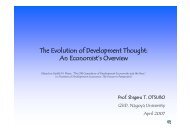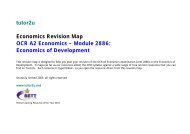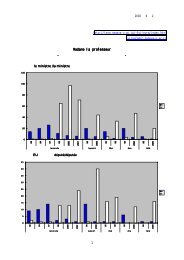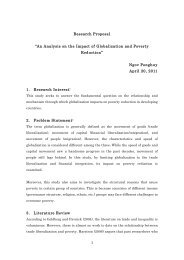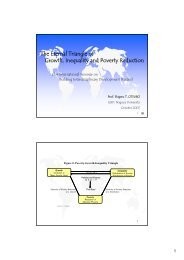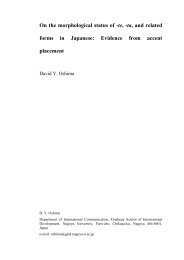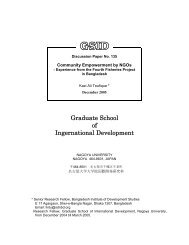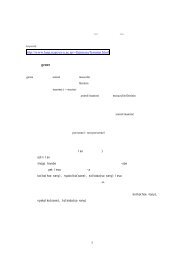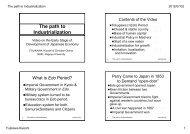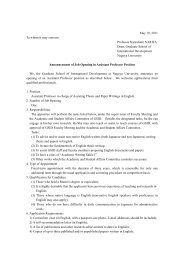Report
Report
Report
Create successful ePaper yourself
Turn your PDF publications into a flip-book with our unique Google optimized e-Paper software.
84 QUANTIFICATION OF BENEFITS FROM ECONOMIC COOPERATION IN SOUTH ASIA<br />
Taneja (2007) highlights the bottlenecks for rail<br />
transportation. Currently goods move by rail by the<br />
goods wagon or by parcel wagons that are attached to<br />
the passenger train Samjhauta Express and rakes are<br />
allowed to ply from some cities in Madhya Pradesh.<br />
The features of this movement are as follows:<br />
• Goods transported by Samjhauta Express parcel<br />
wagons move at fixed timings on a biweekly basis.<br />
• The same number of parcel wagons (10) move on<br />
every trip, whether loaded or unloaded.<br />
• There is no fixed timing for a goods train but the<br />
trains are not allowed move across the border after<br />
5:00 pm as security concerns are cited.<br />
• The number of rakes/wagons that can ply from<br />
Attari to Amritsar are determined usually on a<br />
monthly basis.<br />
• Under a reciprocal arrangement between the two<br />
countries, the wagon balance has to be cleared every<br />
10 days between the two countries.<br />
• There is a scarcity of wagons since demand exceeds<br />
supply. For each month from December 2006 to<br />
March 2007, 20 rakes per month were permitted<br />
while the demand was estimated at 1,000 rakes per<br />
month. The scarcity leads to high transaction cost<br />
and bribes to the tune of US$ 2.5 per tonne in India.<br />
Pakistani traders pay a corresponding bribe of US$<br />
1.5 per tonne.<br />
• Goods are oftentimes stranded for as long as 20<br />
days and sometimes the allotment of wagons takes<br />
two months.<br />
• Since wagon balancing takes place only thrice a<br />
month, there is a scarcity of wagons till such time<br />
that there is a zero balance. From the sixth day<br />
onwards, railway authorities try to restrict the<br />
number of wagons to be moved across the border.<br />
• The Indian crew and engine does not move into<br />
the Pakistani territory and vice-versa. Only the<br />
wagons are allowed to move from one country to<br />
another with the respective country’s engine and<br />
crew.<br />
• The handling capacity at Lahore is limited to 20<br />
rakes. Thus increase in rail wagons/rakes from India<br />
needs simultaneous increase in handling capacity<br />
at Lahore.<br />
• Wagons currently used are antiquated.<br />
• There is no provision for movement of containerised<br />
rail cargo from Amritsar and all containerised<br />
cargo has to be moved by sea.<br />
• Lack of space for customs house agents, poor condition<br />
of sheds, obsolete weighing and X-ray (only<br />
one) machines, and lack of regular communication<br />
between rail and customs officials are additional<br />
problems.<br />
Exporters in Kolkata interested in exporting over<br />
land are unable to book rail wagons and are, therefore,<br />
forced to send shipments from/to Karachi through<br />
transshipment at Singapore. From Karachi the goods<br />
are transported by the land route to Lahore which<br />
hugely increases transportation costs.<br />
The Potential<br />
Although recent trends show number of people crossing<br />
the borders over land have decreased, the duty collected<br />
by customs authorities has gone up from Rs 295,000<br />
in 2002–03 to Rs 1.04 million in 2005–06 and Rs 2.6<br />
million in 2006–07. Commercial trade between both<br />
sides dealing in vegetables, meat, fruits, livestock, and<br />
other products has reached Rs 600 million. In the period<br />
January-October 2007, 715 trucks loaded with<br />
Table 9.14 Route-wise Transactions Costs (TC) per Container<br />
Costs in USD Delhi-Attari, Delhi-Attari, Delhi-Mum- Mumbai- Mum-Dubai- Mum-Karachi, Switch<br />
Rail Road/Rail Karachi, Rail/Sea Karachi Sea Karachi, Sea Bill of Ladling<br />
Rail/Road 325 338 460<br />
Sea 550 550 750-950 550<br />
Transport costs 325 338 1010 550 750-950 550<br />
Bribe for clearances 21 32 48 26 26 26<br />
Other bribes 45 45 200<br />
Total Bribes 66 77 48 26 26 226<br />
Total TC 391 415 1058 576 776-976 776<br />
Transport time(day) 1 1 1.5 6 4 6<br />
Delay (days) 12 12 7 7 8 10<br />
Total time (days) 13 13 8.5 13 12 16<br />
Source: Taneja, 2007




